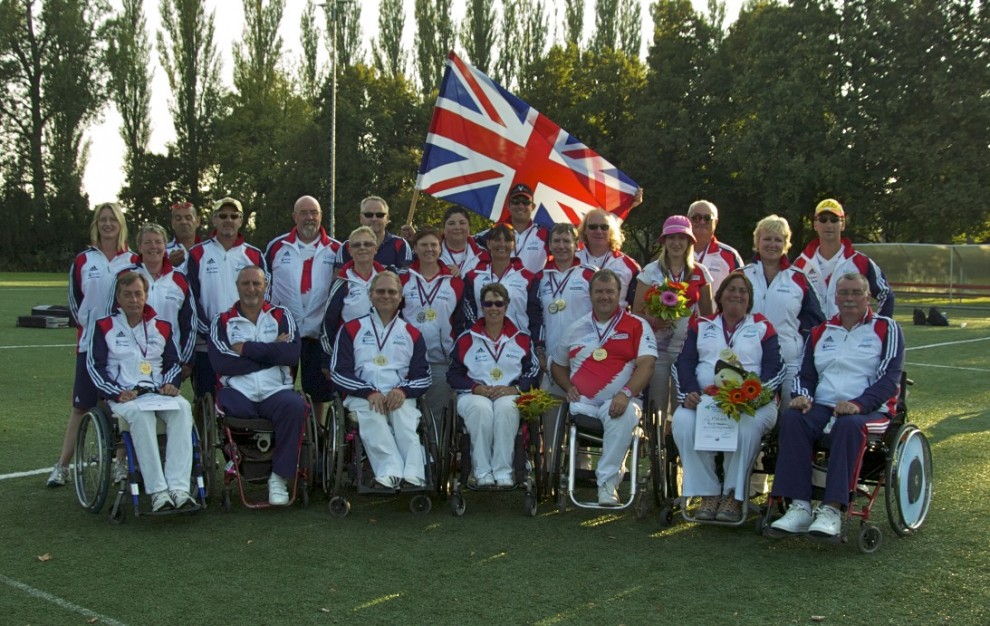 In talking to the lovely Helen George, honorary life member of Archery GB, you get the feeling that every twist and turn in her life has been a sort of happy accident. Very little seems to have been planned, and the unexpected has been not so much a case of a dramatic fall into a situation, but more of a smooth slide into it. The wonderful thing about Helen, though, is that as she slides into a new scene, she embraces it wholeheartedly.
In talking to the lovely Helen George, honorary life member of Archery GB, you get the feeling that every twist and turn in her life has been a sort of happy accident. Very little seems to have been planned, and the unexpected has been not so much a case of a dramatic fall into a situation, but more of a smooth slide into it. The wonderful thing about Helen, though, is that as she slides into a new scene, she embraces it wholeheartedly.
The Young Helen
Helen, who was born and brought up in Scotland, took a huge step at 16 years old when she joined the Civil Service and moved to Reading, in the south of England. After about five years in the Tax Office, Helen changed jobs and worked for a short period as a milk recorder. In 1967, and now back in Scotland, Helen joined the Royal Air Force, in Air Traffic Control.
Stationed at RAF Prestwick, in South Ayrshire, Helen took up every sporting opportunity that presented itself. She had the honour of representing the RAF at the Royal Tournament, in a driving event. And she met a very special young man: Tony George.
In 1971, Helen and Tony left the RAF and married. Having been trained in electronics, Tony’s work was with computers. In those early days of information technology, the computer programmer’s life was often a peripatetic one, and for many years, the couple moved around the country to wherever Tony’s work led them; in 1992, they settled down in the north-east of England.

Getting into Archery
One of Tony’s interests was archery (“At that time, I thought it was boring.”), and in the true spirit of matrimonial compromise, Helen took up the sport to keep him company.
“I started doing archery in 1989, and I shot for Northampton County. But after a couple of years, old injuries – ones I’d sustained from other sports – started causing me problems, and it was becoming difficult to shoot competitively. As a competitor, I couldn’t cope with this. Following advice from David Clarke, who was GB Team Manager at the time, I took up coaching. With his help and encouragement, I went up through the coaching grades to reach Senior Coach level with Archery GB.”
During the 1990s, Helen and Tony George enjoyed several short breaks at Bush Farm, a picturesque B&B in the Shropshire countryside. The B&B owner, Ann Webb, was at that time manager of the GB Paralympic archery team and Honorary Chairman of the Para-Archery Committee. Through their acquaintance with Ann Webb, Helen and Tony became interested in helping with para-archery events.
“In 1998, we helped as general dogsbodies at the first ever FITA World Championships at Stoke Mandeville. By the way, FITA is now known as the World Archery Federation. This event piloted the new archery-specific classification system, which is still used today.”
Stoke Mandeville: Birthplace of the Para-Sport Movement
Sir Ludwig Guttmann (1899-1980) was, metaphorically speaking, father of the para-sport movement. He was a brilliant German neurologist and passionate advocate of physical exercise as a means of therapy for injured military personnel. It was Dr Guttmann, a Jewish refugee, who set up the National Spine Injuries Centre at Stoke Mandeville Hospital, in Buckinghamshire. This specialist unit, opened in February 1944, became the birthplace of revolutionary new therapeutic systems, which focused on the building of physical strength and self-respect.
On July 29th 1948, as the Olympic Games were officially kicked off in London, the very first Stoke Mandeville Games were being held at Stoke Mandeville Hospital. Organised by Dr Guttman, this competition was a sporting arena for wheelchair athletes from all over the UK – a harbinger of great things to come. When Dutch ex-servicemen joined the competition in 1952, the event became known as the International Stoke Mandeville Games.
In 1960, Dr Guttman held the 9th Annual International Stoke Mandeville Games in Rome, alongside the Olympic Games, and from then on, the newly named Paralympic Games have taken place every four years. Since the 1988 Games in Seoul, Korea, the Paralympics have been held in the same host city as the Olympic Games, and the two competitions have been united.
Those who were acquainted with Dr Guttmann have told Helen that he was a very determined and forceful man.
Coach and Ambassador for Disabled Archers

By the beginning of the 21st century, Helen and Tony George were well and truly immersed in the world of para-archery.
“In the early 2000s, we were involved in the establishment of visually impaired archery. As the technical delegate for archery, I travelled to Madrid and China in the campaign to bring VI archery into the fold of the International Blind Sport Association.”
As a high-level archery coach, Helen’s expertise was employed in para-development, a scheme that received sponsorship from the Worshipful Company of Fletchers.
“My role was to identify new talent, interview potential candidates for the Paralympic team, and manage training sessions.”
In 2007, Helen became Chair of Archery GB’s Disability Committee, and in 2009, she joined the para-squad coaching team.
In that same year, 2009, Helen teamed up with a colleague, Tim Hazell, and together they founded the Pass-It-On scheme – a training course for coaches, specifically for the coaching of people with disabilities.
“Part of the training meant that coaches had to get around in wheelchairs, which made them aware of doorways, height issues, aching arms, and so on. We’d insist that they spend long periods in wheelchairs, so that they could grasp the full implications of this type of restriction. Anyway, on one occasion, I said to a young able-bodied international archer, who’d been in a wheelchair all day, ‘Are you going to shoot now?’ She looked me in the eye and said, ‘On your bike.’”
With a background in engineering, Tim Hazell was – and still is – skilled in finding solutions to challenges. With a knack for thinking outside the box, he invented bespoke equipment and techniques for his students. Today, he runs his own company, Elephant in the Room, which provides expert training in disability awareness.
After nearly five years, Helen resigned from the squad in order to join the World Archery Para Committee. (Members of this committee must take an impartial role, and are therefore not permitted to be affiliated with a national team.) Working alongside Qualified International Classifiers – who, by the way, are forbidden to assess and provide classification for a compatriot – Helen was involved in rules and classification. She remained on the World Archery Para Committee until 2017.
“After the London Paralympics, in 2012, some of the classification rules changed, and several top archers were no longer eligible to compete in the Paralympic Games. Danni Brown, for instance, was no longer considered disabled enough. In Danni’s case, though, this was partly due to her own hard work; her strength and balance had greatly improved through training.”

The Present and the Future
 Helen continues to work hard for the BWAA (British Wheelchair Archery Association), an organisation that promotes para-archery and supports individuals in every aspect of the sport.
Helen continues to work hard for the BWAA (British Wheelchair Archery Association), an organisation that promotes para-archery and supports individuals in every aspect of the sport.
Between October and April, the BWAA runs training weekends at Stoke Mandeville. This event is for every disabled archer, from beginners to world champions. Fully adapted accommodation is available at the venue, and top-class coaches are on hand to deliver training sessions and offer expert advice. If you attend a BWAA training weekend, you’ll be sure to run into Helen.
Earlier this year, Helen and Tony received the Archery GB Silver Plaquette Award 2018 for: supporting disabled archery at Stoke Mandeville; promoting VI archery; the Pass-It-On scheme; their contribution to the BWAA, LimbPower, and WheelPower. Helen still plays an active role in the WheelPower Multi Sports Events at Stoke Mandeville.
Helen is currently coaching the talented archer, Ken Hargreaves, who has recently made qualifying scores for the GB para-team. Ken has been using a wheelchair since suffering a spinal cord injury in 2003, and he is accompanied everywhere by his faithful assistance dog, Fred.
“Fred is wonderful,” Helen told me. “If Ken drops anything, Fred picks it up. At the Invictus Games in Toronto last year, Prince Harry gave him a special bandana!”
Over the last 20 years, Helen has contributed hugely to the para-sport movement. She is truly someone who has made a difference.
“The sport’s taken us all over the world, and we’ve made an awful lot of friends through it.”

